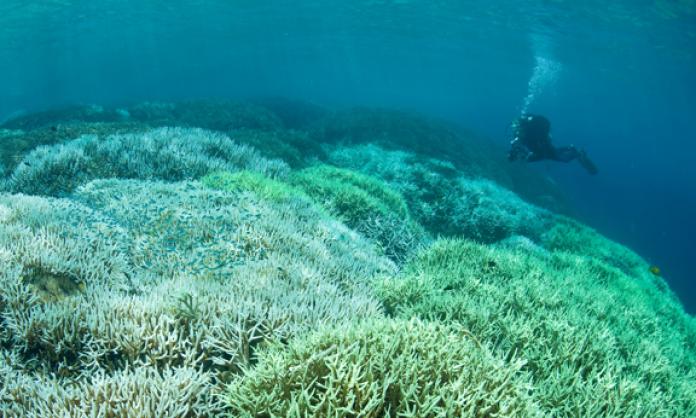The Liberal leadership spill has drawn attention away from what should rank among the biggest scandals in the history of Australian politics: the government’s gift of almost half a billion dollars to the Great Barrier Reef Foundation (GBRF), an organisation whose barely concealed role is to provide greenwashing for the fossil fuel industry.
There’s no cause to lament that prime minister Scott Morrison will shift the government further down the path of climate change denial. With the GBRF grant, and the ditching of emissions reduction targets as part of the National Energy Guarantee, Turnbull had already thrown science out the window and put himself entirely at the service of the coal barons.
This is when the climate warning lights are flashing red. In the Northern Hemisphere, summer temperature records have tumbled. Wildfires have left a trail of death and destruction across North America and Europe. Here in Australia, the entire state of New South Wales is in drought, and the earliest total fire ban on record was declared in some areas on 15 August.
New evidence is piling up almost daily: if we don’t rapidly reduce emissions, the consequences for the planet, and humanity, will be dire.
The Great Barrier Reef will be one of first things to go. The Reef is imperilled by the rising temperature and acidity of the ocean. Mass coral bleaching events over the past few years have killed off large areas. If current trends continue, the whole thing could be gone as soon as 2050.
The government’s gift of $444 million to the GBRF – the biggest grant to a not for profit organisation in Australia’s history – tells you everything you need to know about its priorities. Ordinarily, such organisations must enter a competitive tender process to win even the smallest amounts of government funding. The GBRF, however, was simply handed the money.
This was as much of a surprise to the GBRF as to everyone else. Prior to GBRF chairman John Schubert’s 9 April meeting with Turnbull and Josh Frydenberg (then environment and energy minister), when the money was offered, the foundation had expected to receive a grant of $10 million.
This would have been more in line with the scale of the GBRF’s operations to date. In 2017, it boasted revenues of only $7.7 million, and employed just six full time and five part time staff. It has functioned, primarily, as a conduit for research funding to larger (and more qualified) environmental and scientific organisations.
According to its 2017 annual report, among the top recipients of GBRF funding were the Bureau of Meteorology, the Australian Institute of Marine Science, the CSIRO and the Great Barrier Reef Marine Park Authority. These are all government agencies. Which raises the question, if there’s hundreds of millions floating around for environmental programs, why not just fund them directly?
Does the GBRF have some special expertise that can’t be found within government? When it comes to science – whether of reef conservation or climate change – the answer is clearly no. The CSIRO alone has more than 5,000 staff, many of whom are highly qualified experts in relevant fields.
There’s one thing the GBRF has, however, that makes it perfectly suited to the role the government hopes it will play: its board is stacked with former and current mining and other big business executives.
The GBRF chairman, John Schubert, is a former Esso Australia managing director and director at BHP Billiton and Qantas. Also on the board are Business Council of Australia president and former Origin Energy managing director Grant King, former CEO of GE Mining Steven Sargent and former Rio Tinto executive Phillip Strachan.
The broader “Chairman’s panel” similarly involves a who’s who of Australian fossil fuel industry bigwigs and sundry other business luminaries including executives from AGL, BHP, Peabody Energy, Rio Tinto and Shell.
Once you know this, it all becomes very clear. The GBRF’s purpose isn’t to protect the Reef. Its purpose is to protect the image, and the profits, of the big mining and other businesses that stand to lose from any serious attempt to tackle climate change.
The government’s grant gets it a piece of this corporate greenwashing action. By giving the money to the GBRF, it can create the appearance of taking the threat to the Reef seriously, while being assured that the cash won’t be used in ways that would conflict with the interests of its big business backers.
The 90-page agreement struck between the government and the GBRF on how the grant will be spent doesn’t mention climate change once. What we get instead is typical corporate greenwash waffle. Projects will include “newly developed and innovative activities to repair reef damage and build the Great Barrier Reef’s social, ecological and economic resilience”.
The absurdity of it all was perhaps best captured by satirical news site the Beetota Advocate headline: “GBRF Announce Plans To Spend $444 Million Painting All The Coral Pretty Colours Again”.
No amounts of “newly developed and innovative activities” will save the Reef if we don’t reduce emissions. But this is exactly the thing that the companies behind the GBRF oppose.
To get a sense of the scale of this scandal, we need imagine only what would happen if, for example, a Labor government had given $444 million of taxpayer money to a non-government entity run by the trade union movement. A fund, let’s say, for the improvement of workplace health and safety. There would be hell to pay!
Such is the dominance of corporate interests in Australian politics, however, that it appears increasingly unlikely that anything much will come of it.
A widely cited recent piece in the New York Times Magazine, “Losing Earth: the decade we almost stopped climate change”, by Nathaniel Rich, points to human nature as the reason why we’ve failed to halt climate change. We’re all just too focused, he argues, on our individual, short term interests to make the changes needed to save the planet.
This is rubbish. It’s not the mass of people refusing to change. According to an annual Lowy Institute Poll, a large majority have supported serious action on climate change for at least the last decade. This year’s poll found that 59 percent of people agreed with the statement, “Climate change is a serious and pressing problem. We should begin taking steps now even if this involves significant costs”.
The people dragging their feet are our political leaders. The reason for this is simple: they’re beholden to the interests of big business, for which any significant government intervention to reduce emissions is a threat to profits.









